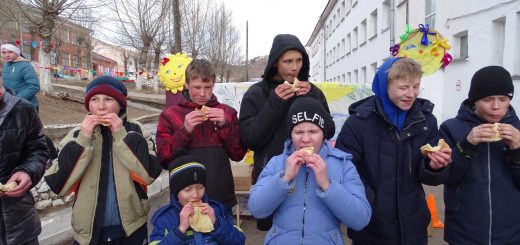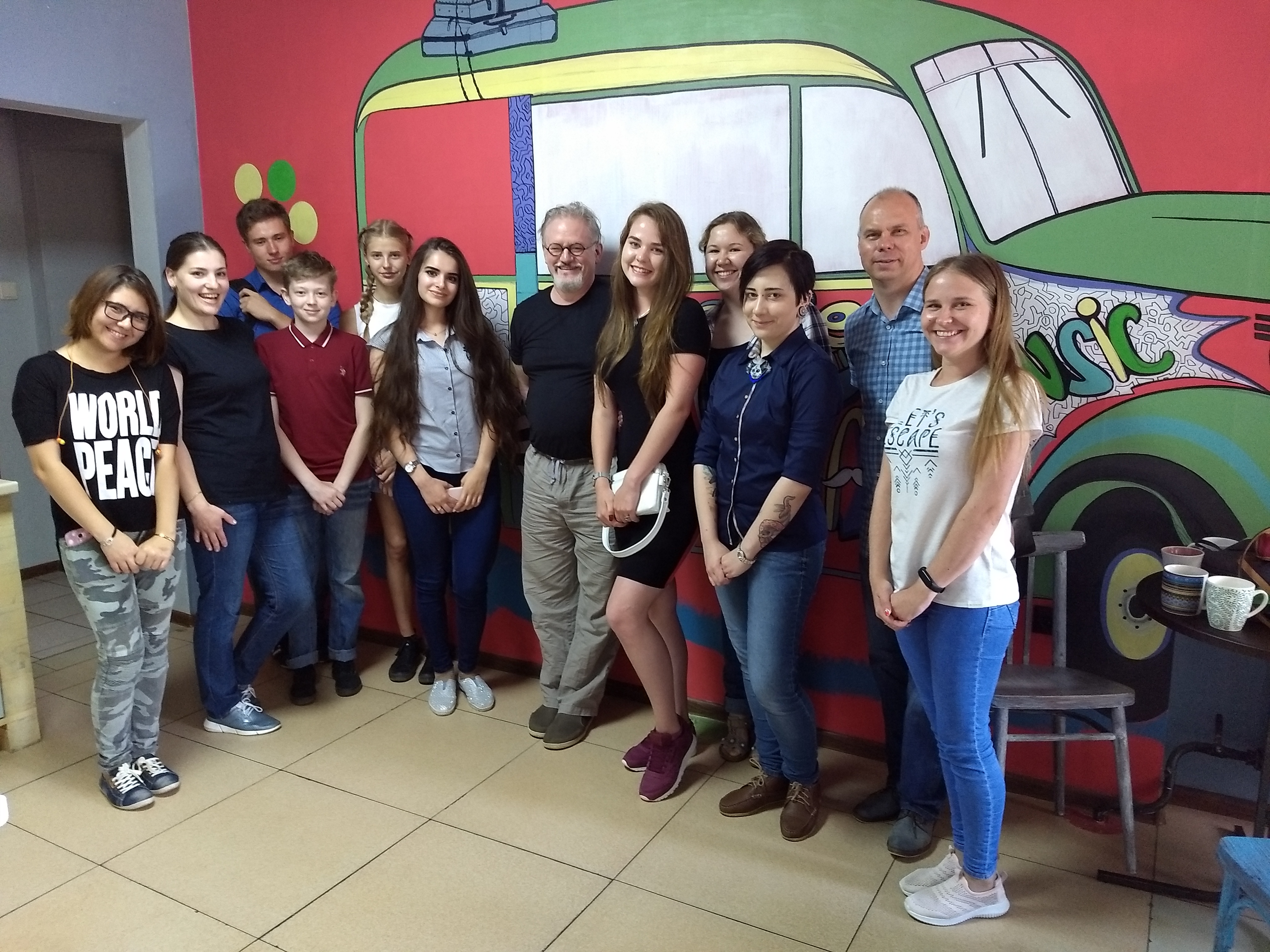My summer in Chita: 10. Family camping on Lake Arey
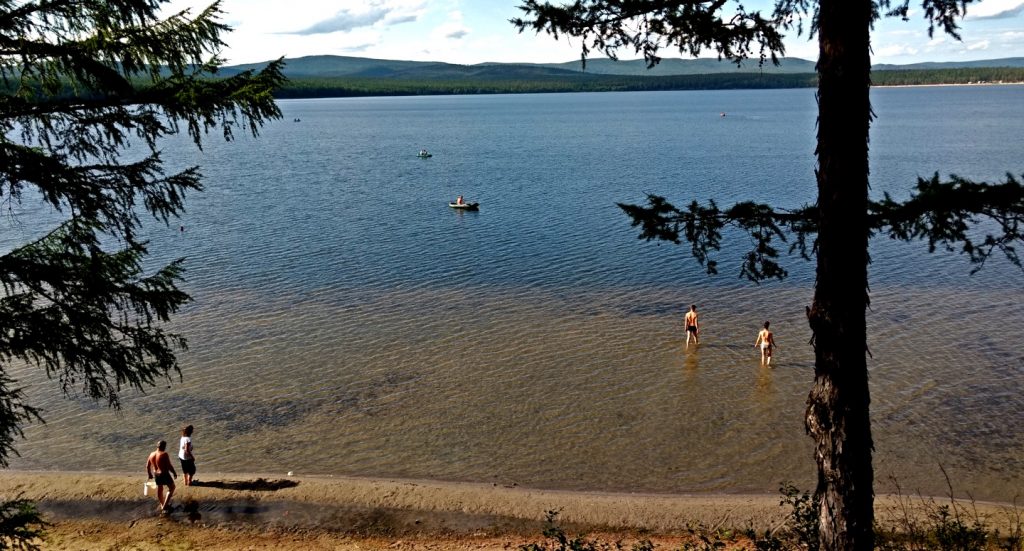
Arey Lake
I joined Elena Anatolievna and her family on a camping trip on Lake Arey. This lake is 220 kilometers west of Chita and sits alone in the larch, birch and pine forests. There is a lot of ancient lore attached to the lake, most notably that Chinghis Khan and his troops came to the lake for rest and relaxation. This spring-fed lake’s mineral properties are considered very healthful. Plus the mud from one part of it is curative. And then there are the “kartoshky,” spherical tubers of a water grass that are supposed to be generally good for what ails you.
We got going by 10am Friday morning in their SUV that was packed to the gills with bedding, tents, loads of fresh produce and home canned pickles and jams, and the last purchase was an enormous watermelon wedged between Elena’s legs in the front seat along with her purse and other luggage. We were Elena, her husband, Sergey, their 16 year old son Maxim, and me.
The drive was beautiful–open grassland interrupted by meandering rivers, some small copses, and low mountains making the horizon. My American eyes still don’t quite understand such vast tracts unfenced and undeveloped. Much seems to be used to pasture cows, and with few fences, small herds frequently blocked us the highway as they crossed it.
The road was good and sometimes excellent. It was a two-lane highway, with the occasional passing lane on a hill. Though a major truck route, passing was easy with the long open vistas.
Several weeks before was fire season, and on this same highway when going to Petrovsk-Zabaikalsky we encountered wildfire. But there had been some good soaking rains and now the air was clear and the fires gone. Lake Arey’s park was recently re-opened.
Arey is a slightly flattened oval, the long diameter going north-south, is about 2 times the length of the short one. We camped in a larch forest on the south end among a great mass of other weekend campers.
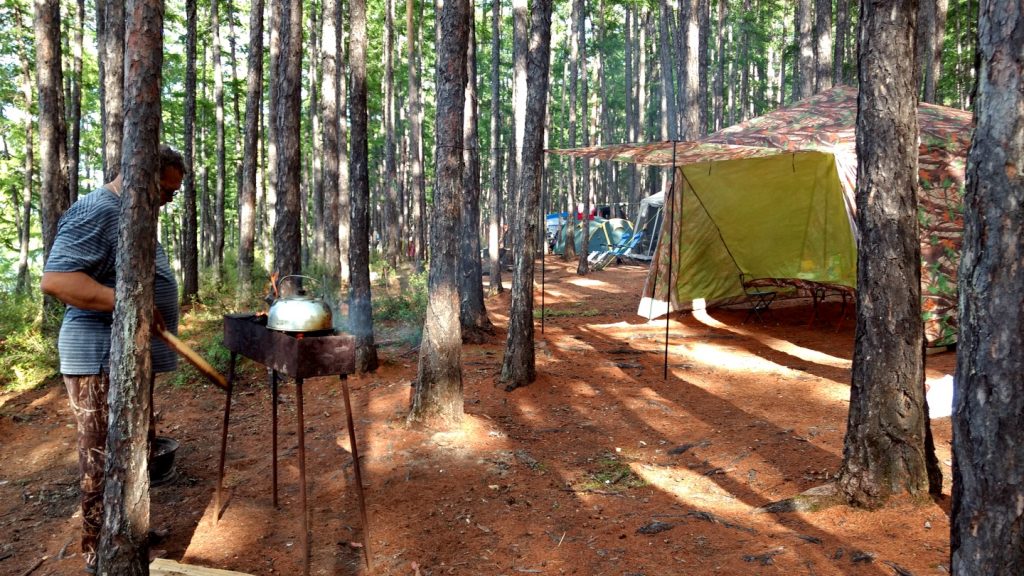
Sergey working on the fire in the shashlik grill, water heating for tea.
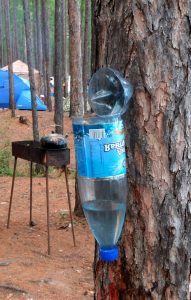
Standard washing up arrangement–an upside-down bottle nailed or lashed to a tree. Open the cap a little to let the water drip.
The standard camp arrangement was just like ours: a kitchen tent with small folding table and chairs, modern external-frame nylon tents, and the shashlik grill from home–an oblong iron box the right width for shishkabob skewers. Iron legs screw into the bottom putting the whole thing at standing height. One end has an iron plate for the ubiquitous large aluminum tea kettle. Everyone brought their own wood. The lake water was clean enough for washing and could be boiled for drinking. Each camp made its own toilet trench and several had little pop-up “toilet tents” like ours for privacy.
The cornerstone of the evening meals was shashlik–marinated and grilled pork, sometimes cooked on the older skewers and sometimes in the newer wire grilling pans with wire grill tops that hold the meat in place. Instead of potatoes the starch was a wide variety of breads, both sweet and regular. At all meals there was a large pile of fresh vegetable pieces: tomato, cucumber, bell pepper, fresh sprigs of dill, green onion and mild garlic greens. Another plate was filled with pickle chunks. And a big bowl of Elena’s lecho, a bell pepper and tomato sauce you take by the spoonful and put on bread or right in the mouth, or dress up the shashlik with it. All the vegetables and pickles and jams were from the two families’ dacha gardens and home canning.
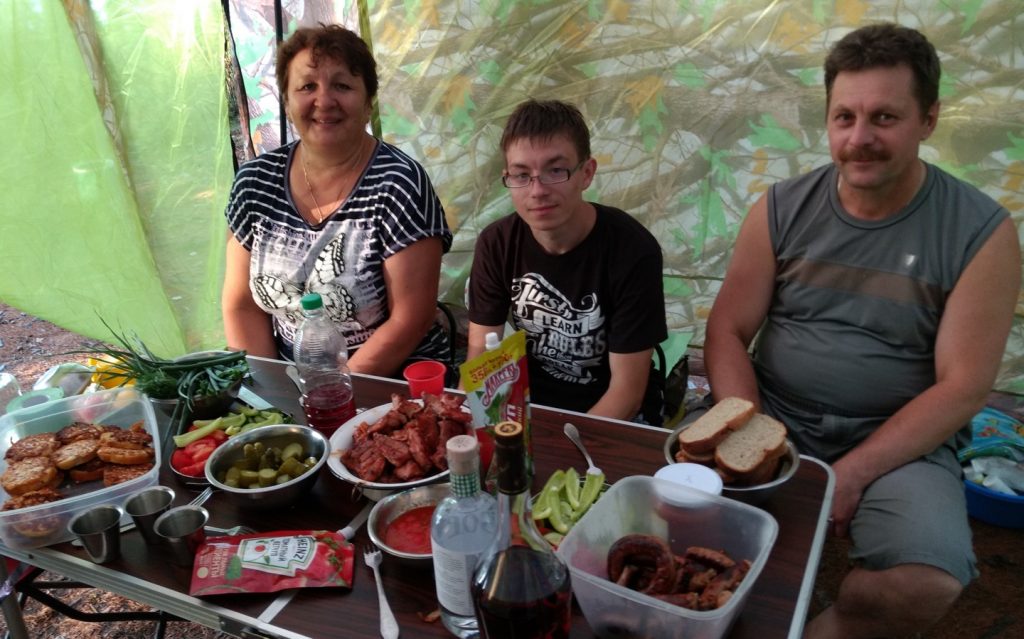
Sveta, Sasha and Igor ready for shashlik, grilled sausage and “butter-brot,” ie. open-face sandwiches, in this case ham under melted cheese prepared at home for snacking and travel.
There were no personal plates. You speared whatever you wanted with your fork and if you needed to put it on something, that was what a piece of bread was for. Sauces were Heinz ketchup (it is a hoot to read its ingredient list in about 12 languages, many in Cyrillic, but also in about three other non-Latin, alphabets–we weren’t in Kansas anymore!), chili ketchup, mild horseradish, fiercely hot mustard, plus raspberry and black currant jams to spoon on anything and in your tea if you wanted. Tea with milk or jam followed with sweets–pastries and sweetened rusks (addictive!)
And of course there was toasting. But before getting into that I need to introduce the rest of the group. Sergey’s workmate, Igor and his family, wife Sveta and 14-15 yr old son, Sasha, joined us at the campsite. Maxim said that Igor was a fishing maniac, and it was true.
Igor and Sveta asked if Americans did this kind of camping, and I said I thought we did. I said that some tried to get away from the crowds like this, but others wanted some comforts of home, the main point being to get out under the sky and leave the city behind for a couple of days. The toasting was clearly important–especially to Igor who couldn’t stop saying things like, “Look at that lake, and the sky!” and “What is better than being out here with friends?” and “Can you smell that?! The trees and the lake?!” I love the toasts of Saturday: 1. To nature and being in it. 2. To parents 3. To Love (the required 3rd toast) 4. To new friends and being included, 5. To better understanding between our countries and the success of the Putin-Trump meeting (offered by Igor) 6. To children.
And then Igor and Elena sang. The night before, Igor asked what Americans sang when together with friends and maybe after a few drinks. I said that we didn’t really do that. Maybe some did, but it was not a norm. He was surprised by that. So they sang old songs. On one, Igor started singing louder with verve and a swung fist of gusto. I asked if it was old. He said, very old. It was Kazakh (Cossack), and he is Kazakh, too. Elena brought in some children’s songs. I asked if they knew “Ekh, Dorogi!” (Ah, the roads!) a poem and song from WWII that I’m learning in my Russian lessons. They sang a good bit of it. (A version by Vitaly Tolochkin, 10 yrs old, from the Children’s Center we help in Petrovsk-Zabaikalsky https://www.youtube.com/watch?v=c675l2ST7cM See our post about this: Vitaly wins 2nd Place, Zoya wins Audience Favorite!) They sang Moscow Nights. Finally, I mustered the nerve to sing something–first time in 28 years. It was a song my Mom sang in the car with us little kids in the back. “I’ve Got Sixpence,” something I think she learned from her father from WWI.
In the afternoon before this evening of quiet song–accompanied by other campsites’ singing (and boomboxes!)–we made the circuit of the lake, a three-hour mosey sometimes along the sandy bank and sometimes just inside the surrounding forest.
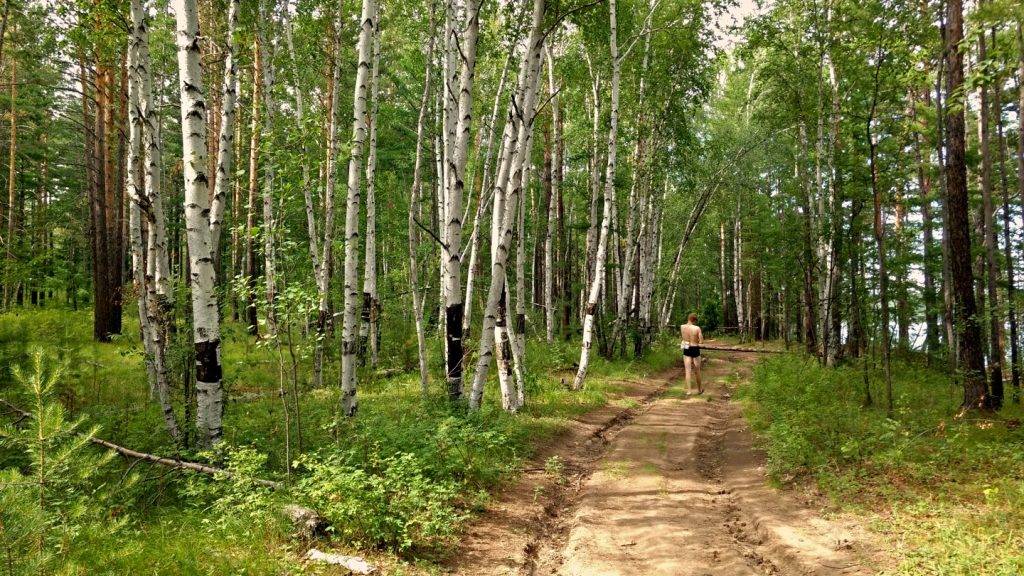
Maxim on the tour of the lake
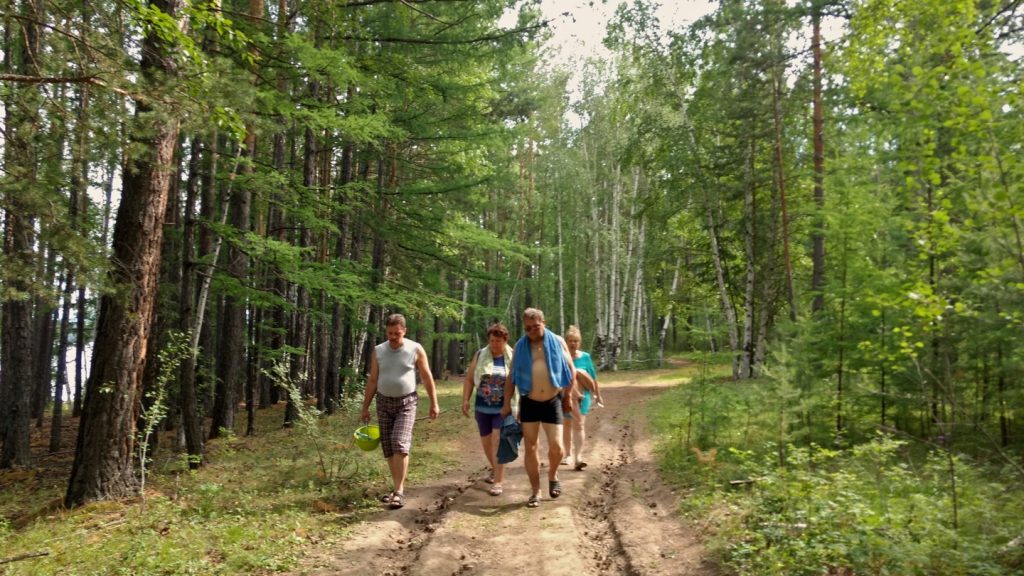
Igor, Sveta, Sergey and Elena on the tour around the lake.
We walked clockwise, everyone here seems to know the Buddhist/shamanist directive to walk around sacred things in a clockwise direction. We passed the spring where people crowded with their bottles to collect the mineral water, past long fallen big trees whose walls of wild roots were always worth a souvenir photo. Across the lake we finally made it to the “Kristal” resort, a leftover from Soviet days, still operating under a private owner, but with few improvements made, and some parts just a wreck. But its beach is nice and the cabins nestled just inside the forest and facing the setting sun looked inviting. I was told that in Soviet days, work units would send their employees to such resorts in the summer as part of their employment, a kind of forced enjoyment…I wonder if that works?
We made it round to where the healing mud should be, but both Igor and Elena could not find it. Instead they both let out a shout that they found “kartoshky,” the spherical tubers of one of the water grasses. They ranged in size from a marble to a ping pong ball and from black to mossy green. Elena suggested I try one. It had no taste at all, just a soft rubbery texture. I’m sure my digestive system thanked me!
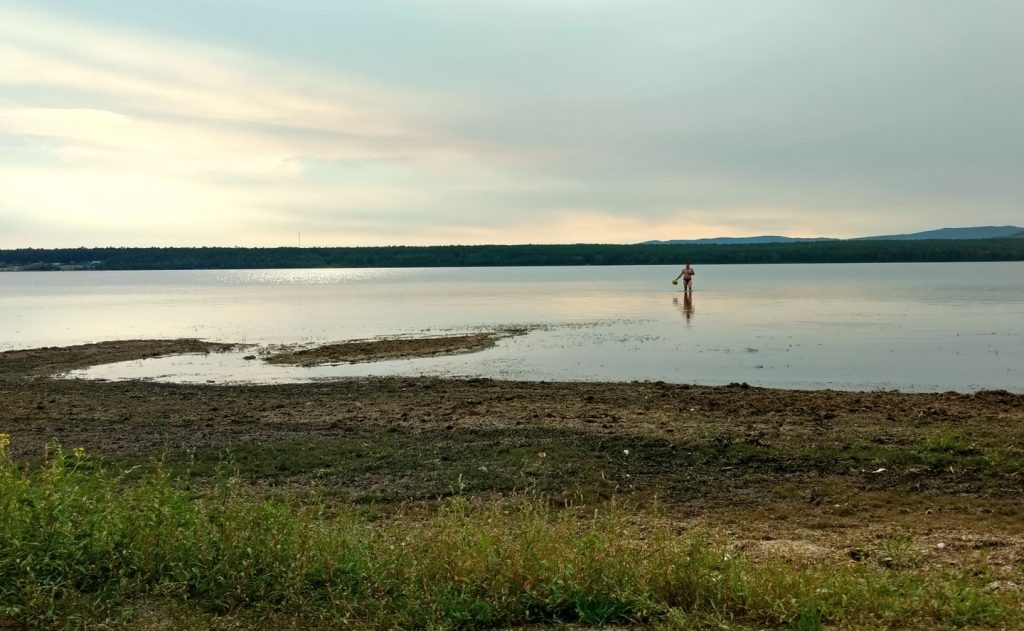
Igor looking for the wonderful mud…and not finding it.
If we’d made the circuit three times, all kinds of benefits would accrue, but a 10 hour walk wasn’t in the cards for this short weekend.
In the morning before the walk, Igor took Maxim and me fishing in his inflatable boat. We started at 7 am. The prey were 4-5 inch perch at a depth of about 20 feet and caught with a tiny pole with a very flexible tip. To make the 3 hour story short, I caught 12, Maxim 18 and Igor 23. Igor cracked me up when he got in a catching streak. One moment, “Op. Yest!” (“Got one!”) in a delighted quiet voice. 10 seconds later, “Op. Yest!” 10 seconds later, “Ooop! …Yest!” Etc etc. He began laughing too.
I told Igor this was my most successful fishing day by far. He said, “Then 100 grams are required when we get back!” ie. a vodka toast to the importance of such an accomplishment: Tom’s Most Successful Day Fishing Ever. At breakfast, after returning in the boat, I refused the 100 grams, pointing out that it was still morning, to which Elena, with her deadpan smile, asked, “So when will it be ok?” I said I wasn’t sure, but I knew it wasn’t 10:40am!
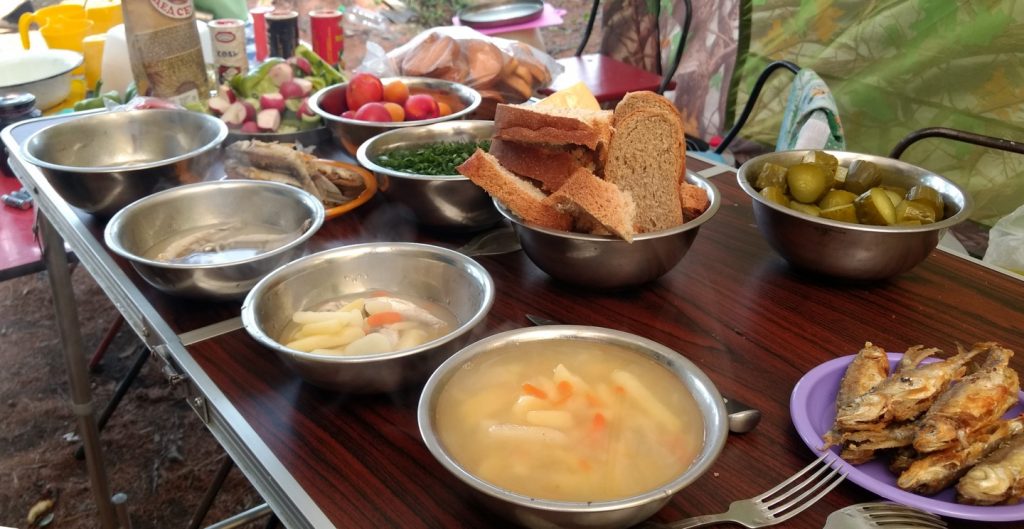
“Ukha,” fisherman’s soup, being doled out, and some pan-fried fish from our morning expedition
About two-thirds of the fish were breaded and pan-fried. The rest went in ??? (“ukha”), “fisherman’s soup”, made simply of potatoes, carrots and onions and salt and whatever fish you have at hand. Chopped green onion and dill was sprinkled on top. Everyone was carefully picking away at the tiny fried fish, tiny fish spines neatly piling up on the table. The whole fish in the soup also had to be eaten by hand slowly and carefully. We had the soup for dinner, but in fact it was better cold the next morning for breakfast.
After a slow Sunday morning and a last try at fishing, the cars were packed. We had one last dip in the lake and then were on our way. At a truck stop with picnic tables by the Ingoda River we had our last meal together–leftovers and kvass, the tasty slightly carbonated drink traditionally made with leftover bread and sugar.
After dropping off Maxim and Elena, Sergey drove me to my hotel. Getting out of the car to shake my hand, I said thank you and goodbye, but he hugged me and replied, “No need. We’ll be seeing each other soon.”


